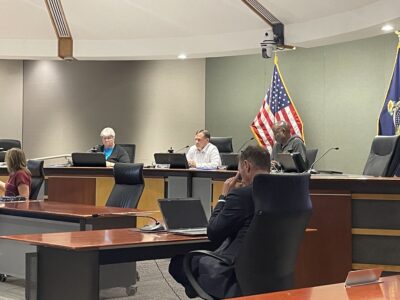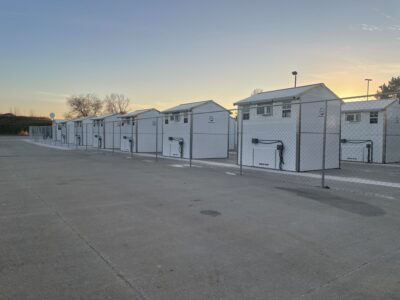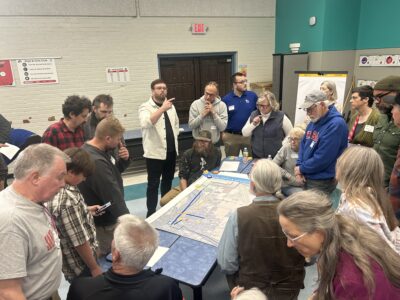North Lawrence camps are set to be shut down on Monday, but questions remain about how no-camping ordinance will be enforced

photo by: Kim Callahan/Journal-World
The site of Camp New Beginnings is pictured after it was cleared on Monday, March 18, 2024, and the fence was removed. The tents in the background belong to campers in an unsanctioned camp for people experiencing homelessness.
The final day that camping will be allowed in Lawrence’s downtown area and along the Kansas River levee trail is approaching, but questions remain about how that ban might actually be enforced.
As the Journal-World has reported, the city in March announced plans to stop allowing camping in Lawrence’s Central Business District — which encompasses the downtown area surrounding Massachusetts Street, along with the levee trail and the Riverfront Mall area up to the intersecting railroad tracks at New York Street — effective Monday, April 15.
That’s when the city intends to shut down one of the community’s more prominent camps behind Johnny’s Tavern in North Lawrence, which previously was located along the periphery of the city-sanctioned support site, Camp New Beginnings, that was closed on March 18.
Two city leaders who spoke with the Journal-World this past week, Mayor Bart Littlejohn and City Commissioner Brad Finkeldei, said that to their understanding, city staff and social service agencies had been working directly with people living at that camp during the past month to help them connect with resources for their next steps.
“My understanding and my expectation is (the unsanctioned camp behind Johnny’s Tavern) will be completely closed and cleaned up on April 15, and anything that’s been left there will be cleaned up just like we did with Camp New Beginnings,” Finkeldei told the Journal-World Friday. “And from that point forward, no one will be allowed to camp there.”
But it’s not clear how the city might actually enforce the ban on future camping in the area.
While city staff members have previously said that camping won’t be allowed in the Central Business District after Monday, they haven’t elaborated on what enforcement will look like in practice — just that it will happen. Finkeldei and Littlejohn both said the decision to start enforcing the ordinance is tied to the increase in emergency sheltering capacity in the community. The ordinance, which was amended in 2020, allows people to camp on any public right-of-way or public property downtown when there is no space available at overnight homeless shelters.
Finkeldei and Littlejohn both shared their expectations regarding the issue with the Journal-World in separate interviews; their colleagues on the City Commission — Vice Mayor Mike Dever and commissioners Lisa Larsen and Amber Sellers — did not respond to the Journal-World’s request for comment.
• • •
Ordinance No. 9754 lists penalties for people convicted of violating the local no-camping law, including a fine of up to $1,000, a jail term not to exceed six months, or both.
But Littlejohn said he doesn’t think the city should be immediately handing out punishments to people who are still camping in the downtown area on April 15 and beyond. That’s especially true for people who have been living at the camp in North Lawrence, he said.
He emphasized that the camp had been shrinking from the roughly 25 people that remained following the closure of Camp New Beginnings, but he said it was still important to treat the people who hadn’t moved out with compassion, even after the deadline.
“Helping folks with that transition is ideal ahead of time, but on that particular day, if we have some folks that are there, I want to make sure that it’s compassionate and it’s helpful and as well-meaning as possible,” Littlejohn told the Journal-World Wednesday. “… That camp has been there for a little bit, so I want to make sure that we are behaving in a way that behooves us with our neighbors and our citizens.”
Littlejohn said he intended to follow the lead of Director of Homeless Solutions Misty Bosch-Hastings, Lawrence Community Shelter Executive Director James Chiselom and others who work closely with the unhoused population.
The Journal-World also asked the Lawrence Police Department for what it thought enforcement of the ordinance should look like. An LPD spokesperson told the Journal-World that there wouldn’t be a one-size-fits-all approach, and that “Enforcement and/or arrest will be a last resort and never the goal.”
“We always prefer compliance over enforcement and are working very closely with city staff and the homeless solutions department,” the spokesperson told the Journal-World. “Our expectation is that it will be an ongoing process, similar to other camping situations, and we will deal with each situation on a case by case basis after this initial clearing to get the land cleaned up and safe.”
The spokesperson said that a staff member in the department, Patrol Commander Hayden Fowler, had been working closely with the city to “be sure we were communicating things clearly to those involved and they knew what to expect and we could be as helpful as possible.”
• • •
After the North Lawrence campsite has been shut down, both Littlejohn and Finkeldei said they expected the work to continue camp by camp. Littlejohn said he thought it was especially important to work with one camp at a time.
“We’re trying to focus all our efforts on one site at a time so we can make sure that we are trying our best to cross all the T’s and dot all the I’s and make sure that we’re communicating — and sometimes over-communicating — with folks to let them know what expectations are, make sure they have resources and wrap-around services available to them, and make sure that they have soft landings,” Littlejohn said.
But what happens when new campsites appear in areas where camping isn’t allowed? Littlejohn said he expects them to be addressed similarly to others that have been reported via a form on the city’s website introduced in October 2023.
Through that process, city staff is dispatched to the area indicated on the form to make contact with any individuals camping there and discuss available services in the community. The campers are then given a minimum of 24 hours’ notice to vacate the area. If they haven’t cleared the area within the designated time, a city staffer will meet with them again, and they may eventually be given a citation for illegal camping and be removed along with their belongings if they don’t voluntarily vacate the area.
Once the work in North Lawrence is over, Littlejohn said he’s most interested in getting a better picture of who is living at other unsanctioned campsites around the city — something the city hasn’t always had resources to do while focusing so much attention on the North Lawrence site. He said that now that the community has the emergency shelter resources it needs to make changes, it’s important to keep the work going.
“That’s been the key, and that’s what has been the central part of our plan that we’ve expressed to everybody — we can’t really do anything until we build capacity,” Littlejohn said. “Now that we have, I want to make sure that we’re moving forward and we continue to have momentum to move forward to address this, because I think that’s the best-case solution for everybody.”







